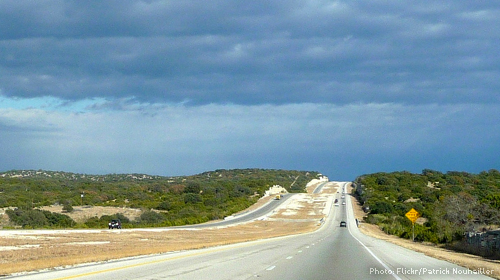
The road to Artesia from Las Cruces, New Mexico, is a scenic three-hour drive past pristine white sand dunes, through chilly, foggy mountain ranges, and across flat, open pampas spotted with yucca plants. Artesia, itself, is a dusty town of around 11,000 people, mostly farmers, ranchers, and workers at local oil wells and refineries.
I traveled that road myself this week, on my way to the new Family Residential Center in Artesia run by U.S. Immigration and Customs Enforcement (ICE). This facility currently houses around 620 women and children from Honduras, El Salvador, and Guatemala. ItтАЩs the first step in the federal governmentтАЩs ill-advised plans to dramatically expand the warehousing of vulnerable children and their parents in facilities throughout the country, at a cost to taxpayers of hundreds of millions of dollars.
I was in Artesia with a small group, representing more than 20 civil and human rights organizations, to tour the facility. For the detained families, whom U.S. Customs and Border Protection had flown from the Lower Rio Grande Valley to El Paso before ICE put them on buses to Artesia, it must feel like they landed on the moon.
The families are held in the dormitory section of a federal law enforcement training center. Today these dorms contain bunk beds and cribs. Additional mobile units have been converted to accommodate the growing number of families.
We spoke to about 30 women, all mothers, who told us they feared returning to their home countries because they or their children had received death threats. Many said they had witnessed or experienced the assassination of a spouse, sibling, or neighbor. In their faces, I saw fear, concern, and desperation. We learned that the average age of the children there was six and a half years old.
In theory, our laws are clear. We do not deport families back to countries where they would face persecution or torture. The right to a fair process is a fundamental American value, enshrined in our Constitution. Yet the majority of families detained at Artesia never get a hearing, and they have little to no access to legal assistance. As a consequence, our nation will deport many women and children who may have legitimate claims to asylum or other legal status back to countries where they face violence, exploitation, and even death.
One mother told us that she had witnessed the death of her sisterтАЩs husband but feared going to the police in her country because she knew they would not help. She described how she barely escaped with her two small daughters, how she had spent all of her savings to get to safety, how many along the way wanted to exploit her and her children, and how she then finally arrived in the United States and turned herself in to U.S. Border Patrol agents.
"I thought, me and my children, we are finally safe," she told us. "Because here in the U.S., I know they follow the laws."
Learn more about immigration and customs enforcement and other civil liberty issues: Sign up for breaking news alerts, , and .
